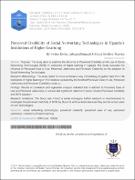Perceived credibility of social networking technologies in Uganda’s institutions of higher learning

View/
Date
2017Author
Bwiino, Keefa
Lubogoyi, Bumali
Mayoka Kituyi, Geoffrey
Metadata
Show full item recordAbstract
Purpose: The study aims to examine the influence of
Perceived Credibility on the use of Social Networking
Technologies (SNTs) in institutions of higher learning in
Uganda. The Study evaluates the influence of Perceived Ease
of Use, Perceived Usefulness and Perceived Credibility on the
adoption of Social Networking Technologies.
Research Methodology: The study opted for cross sectional
survey methodology to gather data from 146 institutions of
higher learning on the variables captured by the modified
Perceived Ease of Use, Perceived Usefulness and Perceived
Credibility construct.
Findings: Results of correlation and regression analysis
indicated that in addition to Perceived Ease of Use and
Perceived Usefulness, a positive and significant relationship
exists between Perceived Credibility and SNTs adoption.
Research Limitations: The Study was limited to senior
managers, further research is recommended to investigate the
perceived credibility of SNTs by Students and Lecturers
because they are the actual users of such technologies.
Practical Implications: This study suggests that managers of
institutions of higher learning believe that a positive change in
understanding and evaluating the source credibility, media
credibility and content credibility of the teaching information
exchanged on SNTs would increase reliance on the use of
social networking technologies in education.
Originality: This research provides an insight into the influence
of perceived credibility on SNT adoption in the education
context and besides, this study is one of the first studies to
align perceived credibility as a significant predictor of SNT adoption in institutions of higher learning in Uganda.
